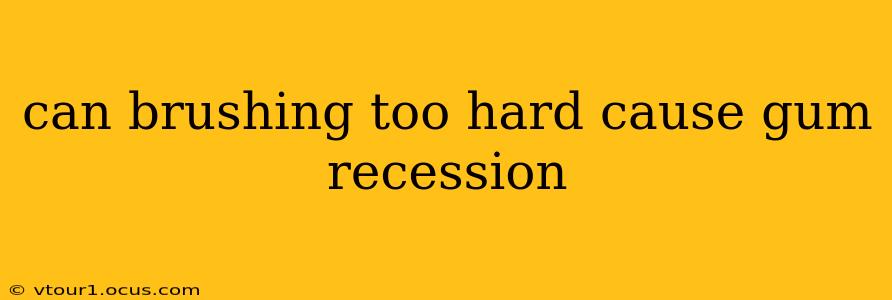Yes, brushing your teeth too hard can absolutely cause gum recession. This is a serious issue because receding gums expose the roots of your teeth, making them more vulnerable to sensitivity, decay, and even tooth loss. Understanding the mechanics of gum recession and practicing proper brushing techniques are crucial for maintaining healthy gums and a beautiful smile.
What is Gum Recession?
Gum recession is the gradual pulling back of the gums from the teeth, exposing more of the tooth root than normal. This process can be slow and gradual, often going unnoticed until significant recession has occurred. While aging is a natural contributor, aggressive brushing is a significant factor that can accelerate the process and even cause it prematurely.
How Does Aggressive Brushing Cause Gum Recession?
The gums are soft tissue, and repeatedly scrubbing them with excessive force damages them. This abrasion wears away the gum tissue, leading to recession. The damage isn't just superficial; it affects the underlying supporting structures of the teeth, compromising their stability over time. Think of it like constantly rubbing your skin with sandpaper; eventually, you'll see irritation and damage. Your gums react similarly to harsh brushing.
What are the Signs of Gum Recession Caused by Brushing?
Recognizing the signs early is key to preventing further damage. Look out for:
- Noticeably longer-looking teeth: As the gums recede, more of the tooth becomes visible.
- Sensitive teeth: Exposed tooth roots lack the protective enamel found on the crown, making them sensitive to hot, cold, sweet, or acidic foods and drinks.
- Notches or grooves along the gumline: These are telltale signs of abrasive damage from brushing.
- Bleeding gums: While some bleeding is normal, persistent bleeding after brushing, even with gentle pressure, suggests gum irritation and potential damage.
- Loose teeth: As gum support diminishes, teeth may become loose.
How to Brush Your Teeth Correctly to Avoid Gum Recession?
The key is gentleness and proper technique:
- Use a soft-bristled toothbrush: Hard bristles are too abrasive for delicate gums.
- Use gentle, short strokes: Avoid scrubbing back and forth. Instead, use small, circular motions.
- Don't press too hard: Imagine you're gently caressing your gums, not scrubbing them clean. The bristles should gently touch the gums and teeth.
- Brush at a 45-degree angle: This angle allows the bristles to reach below the gumline and clean effectively without damaging the gums.
- Brush for two minutes, twice a day: This ensures thorough cleaning without excessive force.
- Consider an electric toothbrush: Many electric toothbrushes have sensors that detect excessive pressure, helping you maintain a gentle brushing technique.
What Other Factors Can Cause Gum Recession?
While aggressive brushing is a major culprit, other factors contribute to gum recession:
- Genetics: Some individuals are genetically predisposed to gum recession.
- Periodontal disease (gum disease): Infection and inflammation weaken the gums, leading to recession.
- Aggressive toothbrushing: As discussed above, this is a major contributing factor.
- Teeth grinding (bruxism): This can put extra pressure on the gums.
- Hormonal changes: Hormonal fluctuations can affect gum health and increase susceptibility to recession.
- Certain medical conditions: Some medical conditions can affect gum health.
- Misaligned or crooked teeth: These can put extra pressure on certain areas of the gums.
How Can I Treat Receding Gums?
If you've noticed signs of gum recession, it's crucial to consult a dentist. They can accurately diagnose the cause and recommend appropriate treatment options. Treatment may include:
- Scaling and root planing: A deep cleaning procedure to remove plaque and tartar below the gumline.
- Gum grafting: A surgical procedure to replace lost gum tissue.
- Guided tissue regeneration: A surgical procedure to encourage regrowth of gum tissue and bone.
Can I Reverse Gum Recession?
While complete reversal is not always possible, early intervention can often slow or halt further recession and prevent more severe damage. Maintaining good oral hygiene and regular dental check-ups are vital for preventing gum recession and preserving your gum health. Don't delay seeking professional help if you suspect gum recession.
Remember, prevention is always better than cure. By practicing gentle, effective brushing techniques, you can significantly reduce your risk of gum recession and maintain a healthy smile for years to come.
